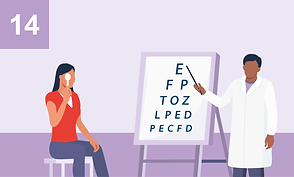Risk Factors and Prevention
ACT NOW
to protect brain health and prevent dementia!
Apart from irreversible risk factors such as genetic heredity and aging, the pathological changes associated with dementia may start accumulating in the brain 15-20 years before the onset of noticeable cognitive symptoms. Therefore, adopting healthy lifestyle habits as early as middle age can help reduce the risk of dementia. Act now and prevent dementia!
Understand the risk factors for dementia and take early prevention!

Physical inactivity
Regular exercise is beneficial for the heart, blood circulation, weight management, and mental health. It is recommended that adults engage in 150 minutes of moderate-intensity aerobic exercise or 75 minutes of high-intensity aerobic exercise per week. For older adults, it is also suggested to include balance and muscle-strengthening exercises.

Smoking
Smoking significantly increases the risk of cognitive impairment and cardiovascular diseases. Regardless of age, quitting smoking early can help reduce the risk of cognitive disorders.

Excessive alcohol consumption
Avoid excessive alcohol consumption to reduce damage to the brain while also lowering the risk of hypertension, diabetes, and stroke.

Air pollution
During periods of high air pollution, it is advisable to avoid outdoor activities. Additionally, it is recommended to maintain good indoor ventilation or install air purifiers to reduce potential air pollutants.

Head injury
Protect your head and avoid injuries. Older adults should be mindful of fall risks.

Infrequent social contact
Maintain a vibrant lifestyle by spending more time with family and friends, expanding social interactions, and cultivating healthy hobbies and personal interests. These activities can enhance brain stimulation and help build cognitive reserves.

Less education
Engaging in active mental activities, learning new things and developing "6 Arts" lifestyle habit, can enhance brain stimulation and help build cognitive reserves and delay deterioration.

Obesity
Maintain a healthy diet by choosing foods that are low in sugar, salt, and oil while being rich in vitamins and protein. Regular exercise is also essential for overall well-being. If you have concerns about obesity, please consult the doctor or relevant professionals.

Hypertension
Maintain a healthy diet by choosing foods that are low in sugar, salt, and oil while being rich in vitamins and protein. Regular exercise is also essential for overall well-being. If you have concerns about hypertension, please consult the doctor or relevant professionals.

Diabetes
Maintain a healthy diet by choosing foods that are low in sugar, salt, and oil while being rich in vitamins and protein. Regular exercise is also essential for overall well-being. If you have concerns about diabetes, please consult the doctor or relevant professionals.

Depression
Depression and cognitive impairment have a reciprocal causal relationship. Pay attention to emotional health, maintain a positive attitude and social life. If you have concerns about mental health or emotional issues, please consult the doctor or relevant professionals.

Hearing impairment
Protect your hearing. If you have concerns about hearing impairment, please consult the doctor or relevant professionals or wear hearing aids.

High LDL cholesterol
Maintain a healthy diet by choosing foods that are low in sugar, salt, and oil while being rich in vitamins and protein. Regular exercise is also essential for overall well-being. If you have concerns about High LDL cholesterol, please consult the doctor or relevant professionals.

Vision loss
Research has found that some eye diseases (such as cataracts or diabetic retinopathy) can increase the risk of developing cognitive impairment. Early intervention in vision problems can also help reduce the risk of dementia.
Source: Dementia prevention, intervention, and care: 2024 report of the Lancet standing Commission, Livingston, Gill et al. The Lancet, Volume 404, Issue 10452, 572–628
ACT NOW
✔ "Six Arts®" lifestyle habit
✔ Regular health check-ups
✔ If you have concerns about physical and emotional problems,
please consult the doctor or relevant professionals as early as possible


